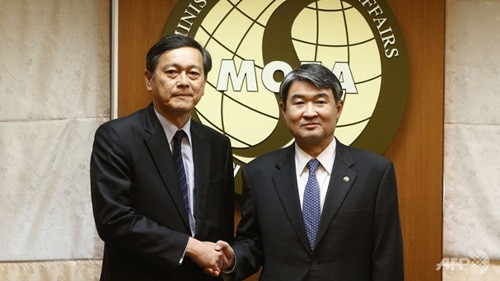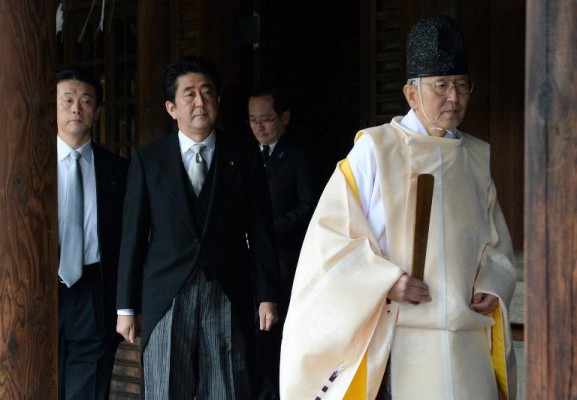Japan-Korea tensions remain unresolved
The first vice-ministerial-level talks in eight months between Japan and South Korea ended without any significant results.
Despite the US’s efforts to mediate, it seems that both Japan and South Korea have been unable to overcome their differences over the wartime history of the Yasukuni Shrine and the sovereignty dispute over the Dokdo/Takeshima Islands. So the opportunity to mend the current strained relationship between the two US allies in Northeast Asia is focused on the US-Japan-South Korea trilateral meeting scheduled for late March.
 |
| Japanese Deputy Foreign Minister Saiki (left) and his South Korean counterpart Cho Tae-yong. (Photo: AFP) |
The talks between Japanese Vice Foreign Minister Akitaka Saiki and his South Korean counterpart Cho Tae-yong in Seoul took place just days after the US urged its two allies to quickly improve relations. However, despite the US’s “impatient” attitude, the meeting ended without any results, as both South Korea and Japan reaffirmed their stance on historical issues.
South Korean Vice Foreign Minister Cho Tae-yong stressed, “In order for bilateral relations to develop sustainably, Japan needs to refrain from making revisionist statements about history and take sincere actions to resolve past issues.” On the other side, Japan also showed no concessions when it stated, “In principle, Prime Minister Shinzo Abe’s cabinet inherits the historical views of previous governments.”
Looking back at the relationship between Japan and South Korea, it can be seen that the two sides' determination to pursue their historical stance has caused this relationship to always be in an unusually hot and cold state. Although the leaders of the two countries have tried very hard to resolve the problems related to the ancient Yasukuni Shrine - a place to worship Japanese soldiers who died in the war, and the sovereignty dispute over the Dokdo/Takeshima islands, this is a difficult problem to find a solution that satisfies the needs of both sides. Most recently, the Japan-South Korea relationship has been shaken again after Prime Minister Shinzo Abe visited the Yasukuni Shrine late last year.
 |
| Relations between the two countries were strained again when Japanese Prime Minister Shinzo Abe visited the Yasukuni Shrine. (photo: AP) |
Although they have not been able to find common ground on historical issues, Japan and South Korea have never completely “turned their backs” on each other. Instead, the relationship of “mutually trusting partners” is still being maintained by both sides. An important reason is that both Japan and South Korea are close allies of the United States in Northeast Asia.
With the goal of maintaining security and economic development, it is quite understandable that South Korea and Japan choose each other as a support in the arc of countries in this region: China, North Korea, South Korea and Japan. In addition to internal needs, maintaining the three-legged position of the US - Japan - South Korea is always reinforced by a third party, the US, because Japan and South Korea are essential factors in the US's pivot strategy in the Asia - Pacific region.
In this latest period of tension, it is the US that has repeatedly urged the two allies to quickly mend relations. US Assistant Secretary of State for East Asia Danny Russel affirmed that "the US continues to emphasize the need for caution and self-restraint on both sides to take steps to mend relations."
Analysts say the US will certainly make every effort to strengthen the Seoul-Tokyo link, which is weakening. Therefore, although the recent meeting between the Japanese and South Korean Deputy Foreign Ministers has not yielded any results, things may change for the better when the meetings are held with the direct participation of the US. And that is also the reason why the world is waiting for steps to resolve the Japan-South Korea diplomatic deadlock to be taken in the trilateral meeting. The meeting is scheduled to be held at the end of March, on the sidelines of the Nuclear Security Summit in the Netherlands./.
According to VOV






